Opinion: Trump was wrong about free speech and falsehoods, but in an interesting way

- Share via
I had a professor who liked to say to students that “you’re wrong, but in an interesting way.”
I’d bestow the same left-handed compliment on Donald Trump for his recent Twitter tirade against the “dishonest and corrupt media.” It came after the New York Times published an anonymously sourced story about how Trump’s advisors were increasingly conceding that the high-maintenance candidate might be “beyond coaching.”
Interestingly, after the weekend tweetstorm, Trump was apparently coached back on message – and behind the teleprompter – to deliver, albeit listlessly, Monday’s speech in which he advocated a Cold War-style campaign against “radical Islamic terrorism.”
But in between was the rat-a-tat-tat (as Jesse Jackson might say) of tweets about the irresponsible press. The blast that got the most attention – and the most cluck-clucking from journalists – read: “It is not ‘freedom of the press’ when newspapers and others are allowed to say and write whatever they want even if it is completely false!”
Oh yes it is, 1st Amendment defenders shot back, and they were right – but so, in a way, was Trump. He just was just out of date.
There was a time – before 1964 and the Supreme Court’s landmark libel decision in the case of New York Times vs. Sullivan – when Trump’s assertion that freedom of the press didn’t extend to falsehoods damaging to someone’s reputation was widely accepted.
But in the Sullivan case, involving a libel suit against the New York Times by an Alabama public official, the court held that even a false statement was entitled to constitutional protection, especially if it was made about the job performance of a public official.
“To persuade others to his own point of view, the pleader, as we know, at times resorts to exaggeration, to vilification of men who have been, or are, prominent in church or state, and even to false statement,” Justice William Brennan wrote for the court. “But the people of this nation have ordained, in the light of history, that, in spite of the probability of excesses and abuses, these liberties are, in the long view, essential to enlightened opinion and right conduct on the part of the citizens of a democracy.”
“Erroneous statement is inevitable in free debate,” Brennan added, and “it must be protected if the freedoms of expression are to have the breathing space that they need . . . to survive.”
New York Times vs. Sullivan and subsequent cases didn’t make it impossible to sue a newspaper successfully over a false and defamatory story. But as a public figure, Trump would have to do more than prove that the the New York Times story about him was false (good luck with that); he would have to prove that it was published with knowledge that it was false or with reckless disregard as to whether it was true or false.
Presumably the Sullivan line of cases is why Trump suggested in February that if he were elected he would “open up our libel laws.” (Actually, there are no federal libel laws, but Trump could appoint Supreme Court justices who might undo New York Times vs. Sullivan.)
Of course, the overarching irony of Trump’s rant about the ease with which “newspapers and others” can say things that are “completely false” is that no one has benefited more from that privilege than he has – at least if you believe the fact-checkers who have been working overtime chasing down his statements. Sad!
Follow the Opinion section on Twitter @latimesopinion and Facebook
More to Read
A cure for the common opinion
Get thought-provoking perspectives with our weekly newsletter.
You may occasionally receive promotional content from the Los Angeles Times.










